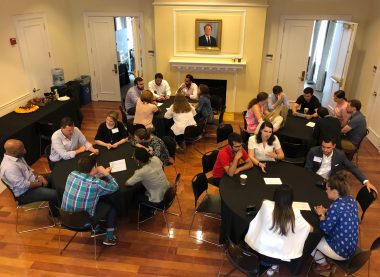Key alumni leaders gathered in Washington, D.C., for an informative retreat hosted by Elon’s Office of Alumni Engagement.
Nearly 30 of Elon’s key alumni leaders gathered in Washington, D.C., in early June to deepen partnerships across their groups, advance their knowledge of the university and share best practices.
 The Alumni Leadership Retreat was the first of its kind to bring together leaders from Elon’s three affinity networks, regional alumni chapters, Young Alumni Council for collaboration and connection. Hosted by Elon’s Office of Alumni Engagement, the retreat provided attendees with time for professional development and discussion of the plans their groups are making for the future.
The Alumni Leadership Retreat was the first of its kind to bring together leaders from Elon’s three affinity networks, regional alumni chapters, Young Alumni Council for collaboration and connection. Hosted by Elon’s Office of Alumni Engagement, the retreat provided attendees with time for professional development and discussion of the plans their groups are making for the future.
The weekend began with remarks from Jim Piatt, vice president for university advancement, who shared an update about Elon’s priorities for a historic year ahead. Topics included upcoming university events, an update on new facilities opening this fall and other changes to the physical campus, and Elon’s next comprehensive fundraising campaign.
“I was thrilled to have joined this wonderful group of loyal and dedicated alumni. Elon’s alumni leaders are critical to the university’s future goals and objectives,” said Piatt. “The Alumni Leadership Retreat was both an excellent opportunity for collaboration across alumni network teams and a time for alumni who are deeply invested in Elon to learn more about the university’s plans for the future.”
Saturday’s retreat took place in The Washington Center headquarters. Director of Alumni Engagement Brian Feeley ’03 kicked-off the second day with a year in review and year ahead presentation. During the discussion, Feeley detailed a record-setting year for the number of alumni attending events, serving in alumni volunteer roles and making a gift to Elon. Aliana Harrison ’08, president of the Elon Black Alumni Network, led the next session titled, “Applying Alumni Leadership to Your Life,” which focused on leadership development.

After a working lunch concentrated on utilizing group resources for engagement, the teams broke out into individual volunteer sessions for the rest of the evening. The regional chapter leadership sessions included discussions about continuing to elevate regional chapter events, which touched on alumni needs for the Welcome to the City, Elon Day and Professional Development Series events. During part of the affinity network’s meetings, the leadership team saw a presentation on Elon’s brand identity standards and how best to communicate with alumni through email and social media.
The number of Elon’s alumni volunteers has grown steadily in recent years. A total of 2,444 alumni engaged in service roles during the 2017-18 academic year, which represents an increase of 31 percent since 2015 and 10 times the number since the start of the Elon Commitment strategic plan in 2010.
To learn more about getting involved at Elon, visit the university’s alumni volunteer opportunities page.


